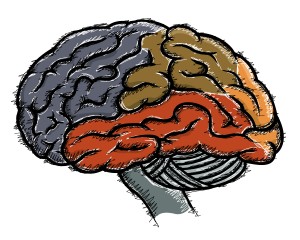A Brain Game to Tease your Frontal Skills
 The frontal lobes of the brain (in gray here) have been compared to an orchestra conductor, influencing, directing, and moderating many other brain functions. Indeed, the frontal lobes support the so-called executive functions: decision-making, problem-solving, planning, inhibiting, as well as other high-level functions (social behavior, emotional control, working memory, etc.). Ready for an executive workout?
The frontal lobes of the brain (in gray here) have been compared to an orchestra conductor, influencing, directing, and moderating many other brain functions. Indeed, the frontal lobes support the so-called executive functions: decision-making, problem-solving, planning, inhibiting, as well as other high-level functions (social behavior, emotional control, working memory, etc.). Ready for an executive workout?
The functions of the frontal lobes are crucial for work and life in general. How can we preserve and enhance these functions? Research tells us that cognitive or brain reserve (i.e., the brain’s resilience to pathology) can be increased by mental exercise. Mental exercise has to be challenging (to trigger the formation of new synapses and neurons) and repeated (a single teaser will not affect your cognitive reserve but it is a good start!).
Here is an example of a challenging exercise stimulating the functions of the frontal lobes. This teaser will require you to: a) solve the mystery of the code by understanding the provided clue (problem-solving and inhibition), b) decide on which strategy you will use to get back to the original message (decision-making), and c) mentally travel the alphabet (working memory). Enjoy!
Can you decipher this message? You can leave your answer as a comment below.
Clue: Each letter in the original message (except the orange Y) has been replaced by another according to this rule: “Take each letter and replace it by the letter in the alphabet that is 3 positions after it.”
.
J R R G M R E: Y R X G R K D Y H
D E U D L Q !
.
Note: Do not write down the whole alphabet unless you really need it.



Good job: You do have a brain.
The directions are correct.
The directions were speaking to the person who ENCODED the original message. Because we are DECODING the message that is “in code”, we have to do the reverse of what the directions say.
Ah okay, had to re-read the directions multiple times before I finally got it. Man, I need to brush up on more mental exercisea if I’m getting this dim.
Actually, teasing your brain is great for long term mental health. Danesi describes brain teasers as an opportunity to expand problem solving skills and think outside of the box. Riddles and brain teasers compel the solver to creatively work through the problem and think of novel solutions. In an article from The Washington Post, Shanker Vedantam reported a study in which researchers took four groups of participants and trained three of them in different fields of mental cognition: memory, reasoning, speed. The remaining group was left as a control and was not trained. There were ten training sessions for each group. Each session lasted 75 minutes. The study found that the groups trained in those skills performed significantly better than those in the control group when tested five years after the training. After half a decade, memory-trained participants showed better memory capabilities, speed-trained participants showed faster thinking skills, and those trained in higher reasoning tested better in solving logic puzzles. Training and teasing the human brain in this way can result in similar, if not greater, long term benefits (especially if training starts at a younger age). It s even fun to tease your brain with puzzles, riddles, and games!
Our brain is a complicated puzzle. This game shows that we still don’t know a lot about our brain activity. Playing such games can develop our skills so that we don’t even notice it.
I personally prefer to improve my brain skills and these kind of games is perfect for it. Although I believe that even popular free to play games like Dota 2, improve your thinking. Only games which are awful for humanity are slots in online casinos; they don’t improve your brains at all and make poor people even poorer.